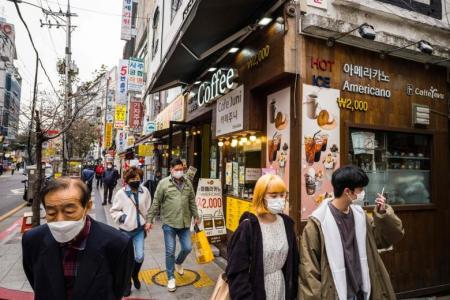South Korea warns against taking Omicron too lightly as daily Covid-19 cases hit 400,000
SEOUL - South Korea's daily Covid-19 infections have spiked beyond the 400,000 mark for the first time, as the country prepares to ease virus curbs and "live with Covid-19".
The authorities expect the current Covid-19 wave, driven by the highly contagious but less serious Omicron variant, to peak later this week or next week.
The daily tally hit a record-high of 400,741 on Wednesday (March 16), bringing the total to 7,629,275, according to the Korea Disease Control and Prevention Agency (KDCA).
South Korea's recent daily figures are among the highest on global Covid-19 tracking sites.
On Johns Hopkins University's Covid-19 map, South Korea's Tuesday figure of 362,328 was at the top spot, above Vietnam (264,790 cases) and Germany (198,955).
Worldometers' Covid-19 page showed that more than one-fifth of the world's 1.68 million new cases reported on Tuesday were found in South Korea - the highest for any country.
Prime Minister Kim Boo-kyum urged against taking the Omicron variant too lightly, voicing concern that there is now a rising trend of people not taking tests despite having symptoms, and ignoring quarantine rules even if they test positive.
Speaking at a daily Covid-19 response meeting on Wednesday, he reiterated the importance of complying with basic quarantine rules to keep everyone safe and to promote faster recovery at home.
More than 1.7 million patients with mild or no symptoms are recovering at home.
"Vaccination is the most effective way to protect yourself against the Omicron variant," he said. "The virus will not disappear immediately even if we pass the peak of the pandemic, we will be forced to coexist. That's why it's important to keep up with vaccination."
As at Wednesday, more than 86 per cent of South Koreans are fully vaccinated. Nearly two-thirds have received their first booster shot.
However, PM Kim voiced concern that less than 10 per cent of high-risk groups have received their second booster shot since the programme was rolled out in late February.
He urged the group, which includes elderly people and those with underlying medical conditions, to get inoculated again.
As the fatality rate stays at a low 0.14 per cent while the number of critically ill cases - 1,244 as at Wednesday - remains manageable, officials are expected to roll back on social distancing measures that are in place until Sunday.
The restrictions include a ban on private gatherings of more than six people and an 11pm curfew on business hours for high-risk venues such as restaurants and gyms.
PM Kim said an announcement will be made on Friday (March 18).
He urged medical experts to begin discussion on adjusting the infectious disease level for Covid-19 from the current highest Class 1, so that the virus can be more effectively managed "within our usual medical system".
Class 1 refers to an infectious disease with a high mortality rate and high risk of cluster infection, which requires immediate reporting and high-level isolation facilities. Class 1 examples include Ebola, Sars and the Middle East Respiratory Syndrome.
Given the high number of daily infections and that Omicron's severity is similar to that of the common flu, some experts have said Covid-19 no longer warrants a Class 1 classification and can be treated effectively at normal clinics.
The government is also moving towards reopening borders - in line with its "living with Covid-19" policy.
From March 21, all vaccinated travellers entering South Korea will no longer have to serve a mandatory seven-day quarantine.
Get The New Paper on your phone with the free TNP app. Download from the Apple App Store or Google Play Store now


